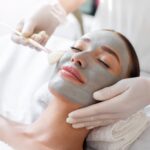
Change your relationship with sales
As a skin care professional, you are probably all too aware of the importance of retail sales. Not only do retail sales determine your paycheck, but they also determine your clients’ results — and in turn, client loyalty and referrals.
In other words: the success of your business depends on retail sales.
Yet, retail sales are not why most of us got into this work. And selling can sometimes feel… well, icky.
In 2019, Skin Care Literature surveyed over 360 skin care professionals — and 95% cited retail sales as the most challenging part of their job. Fears about being “pushy”, not having enough product knowledge, and online retailer competition rose to the top.
But here’s the thing: if you aren’t enjoying selling, your clients certainly aren’t either. The modern consumer is being marketed to all day, every day, so they can smell a sales pitch a mile away.
To rid ourselves of features & benefits lists and the dreaded “hard sell” at the product wall, it’s time to modernize the retailing experience in our industry. Here are Skin Care Literature’s three keys to easy, natural retail sales in 2021 and beyond.
“The key is to position yourself as an expert — not a salesperson — to capitalize on this growth.”
[ihc-hide-content ihc_mb_type=”show” ihc_mb_who=”2,4,5,6,7″ ihc_mb_template=”3″ ]
LEAD WITH SCIENCE
The skincare industry is now worth a whopping 155.8 billion US dollars with no signs of slowing down. This is amazing news for the professionals like you in our industry. However, the key is to position yourself as an expert — not a salesperson — to capitalize on this growth.
According to Cosmetify online search data in 2020, consumers are no longer searching for products for skin conditions (such as “anti-aging cream”), but rather for specific ingredients (like “retinol” or “hyaluronic acid”).
These trends tell us that our clients are getting savvier — and they know the difference between science and marketing. In fact, a study by Nielsen found that 67% of consumers said that an endorsement from an unbiased expert makes them more likely to consider purchasing, and 92% of people trust a personal recommendation over brand marketing.
Of course, the reality is that we carry and get the majority of our education from skincare brands. So to earn the trust of our well-informed clients, we need to adapt our communication.
Ask yourself: Am I using a branded pitch to educate my clients, or my advanced skin and ingredient knowledge? Am I leading with the science behind this formula, or am I using the same product description my client could find online? And, finally, am I explaining why this treatment is right for this individual’s skin, or am I using a one-size-fits-all elevator speech?
This brings us to our next key…
KNOW YOUR SERVICE
The fact is, esthetic services are elective — no matter how important we know professional skin care is.
That’s why it’s essential that we know the service our clients sought us out for. What is their goal? Why did they book this appointment and what do they hope to get out of it?
The good news is that if someone is in your facial bed, they are primed to buy. You just need to figure out what they hope to change or maintain in their skin and then educate them on how they can achieve it. That is your service. And the fact is, achieving results requires home care — i.e. retail sales!
The key is to shift your approach from “how can I make this sale” (which focuses on discounts, fear tactics, or sales gimmicks), to “how can I help this person achieve their skin goals” — why they came to you in the first place. Ironically, not focusing on sales will result in more sales… just without that awkward, end-of-treatment exchange that can dampen the whole experience for both of you.
ADVANCE YOUR SKILL
And finally, just like in any skilled profession, you can’t be an expert without staying an expert. It takes continuous learning and advancing your knowledge to remain a trusted authority in your field.
The key is that your skill is not the facials you perform; it’s your expertise. After all, clients don’t pay for a facial or product — they pay for an outcome. And it’s your expertise (in identifying skin conditions and causation to create personalized treatment plans) that gets them that outcome.
This mindset shift is a game-changer when it comes to improving your retail sales. However, it requires a commitment to continually hone your expertise and advance your knowledge of skin, ingredients, and technology — not just brands and products. That’s why the mission of Skin Care Literature is to provide brand-agnostic education to elevate your “job in esthetics” to a lucrative career as a skin expert.
[/ihc-hide-content]












